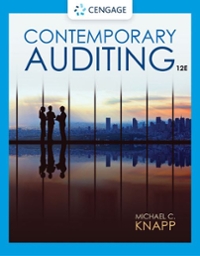In the mid-1990s, KPMG Peat Marwick audited a small, Dallas-based drugstore chain, Texas Drug Warehouse (TDW). Before
Question:
In the mid-1990s, KPMG Peat Marwick audited a small, Dallas-based drugstore chain, Texas Drug Warehouse (TDW). Before beginning the company's 1995 audit, KPMG "made a business decision to reduce the number of hours it would expend on the TDW audit and to use less experienced personnel to perform the audit."1 KPMG did not inform the client's executives of that decision. Following the 1996 audit, KPMG told TDW management that it would be increasing the engagement audit fee the next year. This decision caused TDW to dismiss KPMG and retain a smaller accounting firm, King Griffin & Adamson, to serve as its independent auditor.
The King Griffin audit team discovered material errors in TDW's accounting records shortly after beginning the 1997 audit. The auditors could not reconcile the general ledger balances for accounts payable and cash to the company's subsidiary ledgers and other supporting documentation for those accounts. Further investigation revealed that the errors had existed in the company's accounting records since 1995. After being informed of these errors, KPMG issued a letter to parties known to be relying on TDW's 1995 and 1996 financial statements-which had been accompanied by unqualified audit opinions. The letter indicated that those financial statements were "materially misstated and should no longer be relied upon." In 1999, TDW sued KPMG, alleging that the accounting firm had been negligent in its 1995 and 1996 audits. During the discovery phase of that lawsuit, TDW's attorneys learned that prior to the 1995 audit, KPMG had reduced the budgeted hours for the engagement and assigned less experienced auditors to the engagement team. That discovery prompted TDW's attorneys to amend the lawsuit and charge that KPMG had also engaged in "deceptive business practices" by failing to notify TDW management of its decision to reduce the "quality of its services." Before civil cases proceed to trial, defendants often file a motion asking the presiding judge to dismiss the complaint or complaints filed against them. If such a motion is approved, the judge issues a "summary judgment" in favor of the defendant. To the surprise of TDW's management, the state judge presiding over the TDW-KPMG case approved KPMG's request for summary judgment. TDW immediately appealed that decision to the Texas Court of Appeals. The appellate court issued its opinion on that appeal in late 2001.
Much of the appellate court's review of the lower court's decision focused on two key issues. The first issue involved a controversial ruling made by the lower court judge regarding the engagement letters signed by TDW's president and chief financial officer (CFO) prior to the 1995 and 1996 audits. The second issue addressed the question of whether audit firms must disclose to client management major changes they plan to make in the nature and scope of their audits.
Questions
1. List in a bullet format the key items that should be documented in an audit engagement letter. Is an engagement letter a legally binding contract? Explain.
2. What factors or circumstances may have caused KPMG to reduce the number of budgeted hours for the 1995 TDW audit and to assign less experienced personnel to that engagement? For each factor or circumstance, you identified, indicate whether you believe it is a valid reason for the given decision.
3. Is the "quality" of an audit adversely affected when an accounting firm reduces the planned number of hours to be expended on that audit? Is the quality of an audit adversely affected when an accounting firm uses less experienced personnel to perform the engagement? Defend your answers.
4. Do you agree with the appellate court's ruling that accounting firms should be permitted to determine the nature and scope of their audits without consulting or informing their clients? Explain.
Step by Step Answer:






